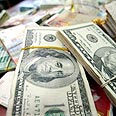
‘Jerusalem needs investors’
Relatively small investment could stop capital’s economic decline, local high-tech entrepreneur Nir Barkat says
JERUSALEM - A relatively small investment in Jerusalem can boost the capital’s economic fortunes, a local entrepreneur says.
“They love Jerusalem,” says Nir Barkat, a successful high-tech entrepreneur and failed mayoral candidate,” They love it, but don’t invest in it. My city is in decline; it’s becoming the poorest in Israel. The (economically) strong sector is fleeing.”
How do you restart Jerusalem’s motor, I ask him.
“The key to rehabilitating Jerusalem, “ Barkat says, “is competitive advantage.”
“It still has some advantages?” I wonder.
“Of course,” Barkat answers: “Jerusalem is the country's biotech capital. There’s a critical mass of researchers and institutes in the field. You can turn it into an American-Israeli center for sperm cell and heart research.”
Barkat is talking about “employment clusters,” a term coined by Professor Michael Porter, one of the guiding lights of business administration. Porter, who teaches at Harvard University, is actively involved in Barakat’s plan to rehabilitate Jerusalem.
Dr. Yigal Weinberg is Porter’s representative in Israel.
“We seek advice from Michael every step of the way. He escorts and supports us without any motive for personal profit,” Weinberg said.
Another advantage that Jerusalem has over other cities is tourism. Despite its centrality to the Children of Abraham, Jerusalem does not try to welcome tourists from abroad. Barkat: “What is there for a tourist to do in Jerusalem during the evening? Nothing.”
Plan for action
How do you plan to attract the entrepreneurs who have left? I ask.
"We suggest attacking Jerusalem’s economic crisis by giving incentives to entrepreneurs to invest and find workers here," Barkat says. "We are advising the government to contribute an additional NIS 1,000 per month to the salary of employees in preferred economic clusters."
“We calculated and found that government aid of NIS 300 million over five years will add 5,000 productive and high-paying jobs. When that happens, the city will begin to change,” he says.
Will such aid really bring foreign companies to Jerusalem when other areas already await them? I ask.
“The government and the municipality will have to offer additional incentives: Sharing the costs in the building of factories, tax breaks, and loans with preferred terms,” Barkat says.
Have you included Palestinian business leaders from east Jerusalem in your plans? I wonder.
“You bet we included them," comes the reply.
Barkat figures that the salvation of Jerusalem from its long-atrophied muscles does not require billions in public investment. All the elements of his plan come to NIS 150 million per year.
One can also start small, says Barkat. Jerusalem’s NIS 40 million extra budget, which the government has already decided upon, could be - if used wisely - the ignition spark for Jerusalem’s advance.
Right now, he says, the motor is stalled.










